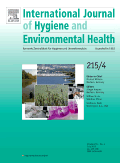
INTERNATIONAL JOURNAL OF HYGIENE AND ENVIRONMENTAL HEALTH
Scope & Guideline
Advancing global health through innovative research.
Introduction
Aims and Scopes
- Environmental Exposure Assessment:
The journal publishes research assessing various environmental exposures, such as air pollution, chemical contaminants, and pathogens, and their associations with health outcomes. - Public Health Interventions:
It emphasizes studies that evaluate the effectiveness of public health interventions aimed at improving hygiene practices, sanitation, and overall health in different populations. - Biomonitoring Studies:
A significant portion of the research involves biomonitoring to assess human exposure to pollutants, chemicals, and pathogens, providing crucial data for policy and health guidelines. - Epidemiological Research:
The journal features epidemiological studies that explore the relationships between environmental factors and health outcomes, contributing valuable insights into disease prevention. - Climate Change and Health:
Research related to the health impacts of climate change, including extreme weather events and their implications for water and sanitation, is a key focus area.
Trending and Emerging
- Chemical Exposure and Health Outcomes:
There is a growing emphasis on the health impacts of exposure to chemicals such as phthalates, PFAS, and flame retardants, reflecting increased public awareness and regulatory scrutiny. - Mental Health and Environmental Factors:
Emerging research links environmental factors, including air pollution and green spaces, to mental health outcomes, highlighting the importance of environmental psychology in public health. - Impact of Climate Change on Health:
Studies exploring the health implications of climate change, including heatwaves and air quality degradation, are increasingly featured, indicating a shift in research priorities. - Infectious Disease Surveillance through Environmental Monitoring:
The journal is expanding its focus on using environmental monitoring, such as wastewater analysis, to track infectious diseases like SARS-CoV-2, emphasizing the need for innovative surveillance methods. - Community-Level Interventions and Health Equity:
Research addressing health equity through community-level sanitation and hygiene interventions is gaining traction, highlighting the importance of social determinants of health.
Declining or Waning
- Occupational Health in Traditional Industries:
Research on traditional industries, such as agriculture and manufacturing, has decreased, possibly due to a shift towards more pressing contemporary issues such as climate change and urban health. - Historical Environmental Health Studies:
There is a declining focus on historical studies that assess past exposures, as the journal seeks to prioritize current and future challenges in environmental health. - Localized Sanitation Issues:
Studies focusing solely on localized sanitation issues without broader implications or connections to global health trends have become less frequent. - Single Exposures without Contextual Analysis:
Research examining single environmental exposures without considering the broader context of multiple exposures and their cumulative effects is waning as interdisciplinary approaches gain traction. - Conventional Water Quality Studies:
Traditional studies on water quality without innovative methodologies or integration with human health outcomes are becoming less common as the field evolves.
Similar Journals
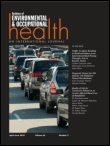
Archives of Environmental & Occupational Health
Pioneering research at the intersection of health and environment.Archives of Environmental & Occupational Health is a prestigious journal published by Routledge Journals, Taylor & Francis Ltd, dedicated to advancing research and knowledge in the realms of environmental science, occupational health, and toxicology. With an ISSN of 1933-8244 and an E-ISSN of 2154-4700, this peer-reviewed journal has gained significant recognition, currently holding a Q2 ranking in Environmental Science and Q3 rankings in Health, Toxicology and Mutagenesis, and Public Health. Established in 2005, it serves as a vital platform for researchers, practitioners, and policymakers alike who aim to address and disseminate findings on pressing environmental and occupational health issues. The journal is not open access, allowing for rigorous peer review processes while still reaching a broad readership. As it converges through 2024, the Archives of Environmental & Occupational Health continues to play a critical role in shaping discourse and fostering innovation in the field, making it an essential resource for those committed to improving both human health and the environment.
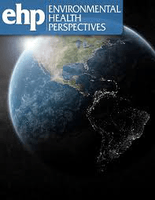
ENVIRONMENTAL HEALTH PERSPECTIVES
Innovating solutions through rigorous environmental health research.Environmental Health Perspectives (EHP) is a premier open-access journal published by the U.S. Department of Health and Human Services, Public Health Science, dedicated to publishing rigorous and impactful research in the field of environmental health. Since its inception in 1972, EHP has become a leading platform for disseminating knowledge on the interactions between the environment and human health, making significant contributions to the fields of toxicology and public health. With an impressive impact factor and a Q1 ranking in both Health, Toxicology and Mutagenesis and Public Health, Environmental and Occupational Health categories, EHP ranks among the top journals globally, reflecting its high citation and visibility within the academic community. Researchers, professionals, and students alike will find a wealth of vital information within its pages, as EHP covers a wide array of topics related to environmental exposures, health outcomes, and policy implications. Furthermore, EHP engages with a global audience through its commitment to open access, ensuring that critical research is available to all, enhancing the collective understanding of environmental health issues since 1972.
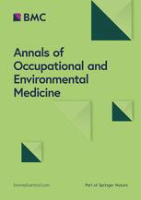
Annals of Occupational and Environmental Medicine
Connecting Research and Practice for Occupational ExcellenceAnnals of Occupational and Environmental Medicine is a premier open-access journal dedicated to the interdisciplinary study of occupational and environmental health, published by the Korean Society for Occupational & Environmental Medicine. Since its inception in 2013, this journal has become a key platform for researchers, professionals, and students alike to disseminate findings that contribute to the understanding and improvement of health in the workplace and surrounding environments. With an ISSN of 2052-4374 and ranked in the Q3 category (2023) in Public Health, this journal emphasizes innovative research and evidence-based practices in the field. Insights from the Scopus ranking, placing it at #428 out of 665 in its category, highlight its growing impact, despite being positioned in the 35th percentile. Its open-access model ensures that valuable knowledge is readily available, fostering collaboration and progression towards healthier work and living conditions globally. With an ambitious convergence of research spanning from 2014 to 2024, the journal stands as an essential resource for those committed to advancing occupational and environmental health.

Air Quality Atmosphere and Health
Bridging the Gap Between Air Quality and Community HealthAir Quality, Atmosphere and Health is a leading interdisciplinary journal published by Springer, focusing on the intricate relationship between air quality and public health. With roots dating back to 2008, the journal has established itself as a pivotal resource for researchers and professionals in the fields of Atmospheric Science, Health, Toxicology and Mutagenesis, and Pollution Management and Policy, achieving a commendable Q2 ranking across multiple categories in 2023. The journal’s rigorous peer-review process ensures that it publishes high-quality research that addresses contemporary challenges in air quality management and its impact on health outcomes. With no Open Access option, the journal maintains a model that prioritizes valuable insights for subscription holders, making it an essential reference point for advancing knowledge on environmental health issues. The journal is based in the Netherlands and contributes significantly to the understanding of atmospheric pollutants and their effects, evidenced by its strong Scopus rankings, positioning it in the top percentiles of various environmental science categories.

Environmental Health
Advancing the Nexus of Environment and HealthEnvironmental Health is a premier, peer-reviewed journal dedicated to advancing knowledge in the interdisciplinary field of environmental health. Published by BMC since 2002, this Open Access journal aims to disseminate impactful research that addresses the critical intersections between environmental factors and public health. With its impressive stature as a Q1 journal in key categories, including Health, Toxicology and Mutagenesis, Medicine (miscellaneous), and Public Health, Environmental and Occupational Health, it ranks within the top tier of its field, boasting significant visibility and a high impact factor as demonstrated by Scopus rankings. Scholars and practitioners alike benefit from its well-rounded approach and commitment to bridging science and policy, making it essential reading for anyone invested in understanding and mitigating environmental health risks. The journal is based in the United Kingdom, with a focus on promoting global accessibility to its findings.
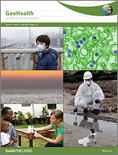
GeoHealth
Empowering Public Health Through Environmental InsightsGeoHealth is a premier open-access journal published by the American Geophysical Union, focusing on the intersection of environmental and health sciences. Launched in 2017, the journal has rapidly established itself with an impressive Q1 ranking in multiple categories, including Epidemiology, Global and Planetary Change, and Public Health, reflecting its commitment to high-quality research and impactful scholarship. Covering a broad spectrum of topics, GeoHealth provides a platform for scientific discussions on key issues such as health, environmental sustainability, pollution, and governance. With an accessible model, researchers and practitioners can freely share and access vital findings, significantly contributing to advancements in public health and environmental management. Exploring critical dimensions of health in relation to environmental changes, GeoHealth is essential reading for those seeking to understand and address contemporary challenges in health and environmental sectors.

GEFAHRSTOFFE REINHALTUNG DER LUFT
Connecting science and policy for a sustainable atmosphere.GEFAHRSTOFFE REINHALTUNG DER LUFT is a reputable academic journal published by SPRINGER-V D I VERLAG GMBH & CO KG, dedicated to the critical examination of air contamination and its implications on public health and environmental policy. With an ISSN of 0949-8036 and an E-ISSN of 1436-4891, this journal has established itself as a key resource for researchers, professionals, and students alike since its inception in 1996. Operating under a stringent peer-review process, it focuses on various aspects of air quality management, toxicology, and the legal frameworks governing pollution control. Although categorized in the Q4 quartile for multiple areas including Health, Toxicology and Mutagenesis and Management, Monitoring, Policy and Law, the journal continues to play an important role in disseminating relevant research that aids in the understanding and mitigation of air pollution issues. As of 2023, it ranks in the 7th percentile across several environmental science categories, reflecting its niche but impactful presence in the field. Researchers looking to stay ahead in the study of air quality are encouraged to explore this journal, which is set to converge its insights through 2024 and beyond.

Lancet Planetary Health
Transforming knowledge into action for planetary well-being.Lancet Planetary Health is a distinguished, open-access journal published by Elsevier Science Ltd, focusing on critical intersections between global health and environmental sustainability. Launched in 2017 and located in the Netherlands, this journal has quickly established itself as a leading platform for innovative research, evidenced by its Q1 ranking across multiple categories in 2023 including Health Policy, Public Health, and Environmental and Occupational Health. With an impressive Scopus ranking, placing it in the top 1% of similar journals, Lancet Planetary Health aims to foster interdisciplinary conversation and collaboration among researchers, policymakers, and practitioners dedicated to addressing the health challenges posed by climate change and environmental degradation. The open access model not only enhances the visibility of published research but also promotes widespread dissemination of knowledge, making it an essential resource for anyone committed to advancing the field of planetary health.
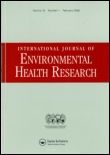
INTERNATIONAL JOURNAL OF ENVIRONMENTAL HEALTH RESEARCH
Fostering Insights for a Sustainable FutureINTERNATIONAL JOURNAL OF ENVIRONMENTAL HEALTH RESEARCH, published by Taylor & Francis Ltd, serves as a cornerstone for interdisciplinary research focusing on the crucial intersections of environmental science and public health since its inception in 1991. With an ISSN of 0960-3123 and an E-ISSN of 1369-1619, the journal spans diverse topics related to environmental health, toxicology, and pollution science, holding high ranks in 2023 such as Q2 in Pollution and Public Health, showcasing its vital contributions to the field. Researchers will appreciate its robust platform as it features rigorous peer-reviewed articles aimed at unveiling the complexities of human health in relation to environmental factors. While the journal maintains a traditional access model, it ensures broad dissemination of high-quality research works. As a reputable source for both emerging and established scholars, the International Journal of Environmental Health Research offers critical insights and advancements pivotal to fostering a healthier planet.

International Journal of Occupational Medicine and Environmental Health
Innovating solutions for healthier workplaces and environments.The International Journal of Occupational Medicine and Environmental Health is a distinguished journal dedicated to advancing the fields of occupational medicine and environmental health. Published by NOFER Institute of Occupational Medicine in Poland, this open-access journal has been providing a platform for innovative research since 2011. With an ISSN of 1232-1087 and an E-ISSN of 1896-494X, it allows for wide dissemination of findings that address contemporary challenges in public health, occupational settings, and environmental issues. The journal has established itself as a vital resource, achieving a Q3 ranking in both Medicine (miscellaneous) and Public Health, Environmental and Occupational Health categories as of 2023, reflecting its commitment to quality and relevance. With a Scopus rank of #295 out of 665 in its domain, it places in the 55th percentile, affirming its growing impact within the scientific community. Researchers, professionals, and students seeking to enhance their knowledge and contribute to the discourse will find the rich content and comprehensive studies presented in this journal invaluable. Explore cutting-edge research from 1994 to the present, and join the conversation on occupational and environmental health issues that profoundly affect global communities.